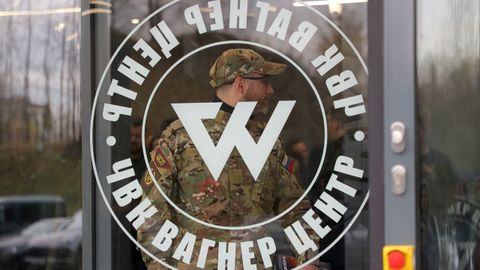
A man wearing a camouflage uniform leaves the Wagner Center during the official opening of the office building in St. Petersburg, Russia, November 4, 2022. IGOR RUSSAK | Reuters
The outcome of the friction between Wagner and the Russian military is uncertain, but it will hurt the Russian Ministry of Defense
Disputes between the Russian Ministry of Defense and the Wagner mercenary group have escalated another step, with the direct involvement of President and Commander-in-Chief Vladimir Putin and the rejection of the group’s leader, Yevgeny Prigozhin.
Russian Defense Minister Sergei Shoigu ordered this Sunday that every volunteer detachment must join the Russian army and therefore sign portfolio contracts to legalize their situation. The order, which does not specifically mention Wagner’s, but is clearly addressed to them, states that “the documents must be signed before July 1, which will give the units the necessary legal status, create common approaches to organizing comprehensive support and fulfilling their tasks.
However, Prigozhin did not agree with this at all and assured that his people would never sign. He said that “Wagner is absolutely and completely subordinated to the interests of the Russian Federation and directly to the Supreme Commander,” but that “most military units are not as effective as the Wagners, and this is because Shoigu is not capable of normal command of military formations.”
Prigozhin – a former hotel businessman who was nicknamed Putin’s chef thanks to his contracts for hospitality industry with the Kremlin – tried in this way to get the president to personally engage and take action against the army command.
And he succeeded, although not in the desired way. During talks with Russian military commanders on Tuesday, Putin said the status of volunteer units should be brought into line with the law and that everyone on the front lines should be equal, acknowledging actually by order of the Ministry.
“That’s the only way we can achieve social guarantees. Because if there is no contract with the state, with the Ministry of Defense, there is no legal basis for state social guarantees. We have to do it, and do it as soon as possible,” said the president.
For his part, Prigozhin quickly reacted publicly to Putin’s words and repeated his rejection of the order to sign the contract with the Ministry of Defense, emphasizing that the Russian State Duma and Putin himself should find an alternative compromise solution in which Wagner members would receive social guarantees and documents as participants in hostilities .
“The Ministry of Defense is an important state body and an important structure. But if it was privatized by a group of individuals, that does not mean that we should participate in that crime,” Prigozhin said in an audio broadcast on the networks.
Possible future scenarios
The friction between Prigogine and the Ministry of Defense is not new. For months, the leader of Wagner has been publishing articles and videos criticizing Shoigu’s work, especially regarding the disorganization and lack of ammunition of Russian soldiers in Ukraine. It seems that you can’t really talk about clashes because, according to various reports that have not been confirmed by the Russian Ministry of Defense, on May 17, Wagner’s mercenaries exchanged fire with Russian army soldiers near Bakhmut.
For these reasons, Prigozhin and his group became a thorn in the side of the Russian army, sometimes more unpleasant than the Ukrainian forces themselves. Therefore, the Ministry of Defense and Putin want to subordinate them. But what does Prigogine’s refusal mean and what are the possible scenarios from now on?
The first is that Prigozhin does not carry out the order as promised. That would give the Defense Department the legal right to force him to comply, but it could mean armed conflict between the two powers. It seems that the “chef” is willing to keep raising his voice because there is no other option, and he does not rule out a military clash either. This solution would not suit either side, but it would suit the Ukrainians.
Although the mercenary formation is not strong enough to pose a real military threat to Russian troops, from a moral point of view it is. If Putin and the Ministry of Defense turned a blind eye and let the Wagners get away with it, they would further lose the trust of their soldiers and supporters.
Another scenario is that Putin relents and reaches some kind of alternative deal with Prigozhin, which will probably involve the withdrawal of that formation from the Ukrainian conflict zone to, say, Africa, which has been his usual territory for years.
The fact is that, in any of the three scenarios, this soap opera will mean continued demoralization in the ranks of the Russian military and Putin’s loss of leadership, which will somehow bring the end of the war closer.
Source: La Vozde Galicia
I am Amelia James, a passionate journalist with a deep-rooted interest in current affairs. I have more than five years of experience in the media industry, working both as an author and editor for 24 Instant News. My main focus lies in international news, particularly regional conflicts and political issues around the world.







